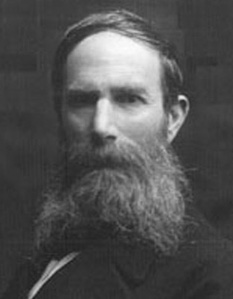| Profile | Major Works | Resources |
Achille Loria, 1857-1943.

Italian economist, sociologist and politician ,of socialist leanings.
Achille Loria was professor of economics at Siena (1881) and Padua (1891), before moving to the university of Turin in 1903, where he would remain for three decades.
Achille Loria began his studies in jurisprudence, and wrote his original 1877 law thesis on the legal and historical basis of landed property. Rather than seeing it as a product of human nature or an eternal "essential" in any social order, Loria posited property was an outcome of a peculiar configuration of historical and economic circumstances. This would be a theme which would resonate for the remainder of his career. To probe deeper, Loria began studying economics in 1877, then moved to Berlin to study with German Historicist. Adolphe Wagner, then moved to London, continuing his studies independently before returning to Italy. Achille Loria was appointed professor of economics at Siena (1881) and then Padua (1891), around which time he fell in with Giornale degli Economisti crowd. Although his historical-institutionalist approach separated Loria from fellow giornalisti, notably high theorists Maffeo Pantaleoni and Vilfredo Pareto, they seemed to have gotten along well enough. In 1903, Achille Loria moved to the University of Turin, where he would remain for the next three decades.
Although claiming membership in many prestigious European academies, Loria saw himself as a public intellectual, with a mission to popularize economic ideas for social reform. He dabbled in Italian political scene, becoming an important figure behind the Riforma Sociale. Although politically leaning towards the reformist democratic left, rather than outright socialism, Loria nonetheless articulated radical ideas on land reform. Loria was eventually made Senator of Italy in 1919. He retired in 1934.
Achille Loria's major work was his Le basi economiche della costituzione sociale (Economic foundations of Society) first published in Italian 1886, but greatly expanded in the second edition (in French) in 1893 (which had to be translated back to Italian). It sets out morality, law and political institutions on the basis of underlying economic circumstances. Loria sees Malthusian population dynamics interacting with the availability of land as the keys to historical changes, and consequently the development of social institutions. Achille Loria's 1893 GdE article on the economic theory of law is often hailed as a progenitor of "law and economics" movement.
As is evident, Loria's ideas intersected the theories of Karl Marx, although Loria eschewed historical materialism and instead proposed what he called "historical economism" (his term). He wrote several revisionist pieces on Marx, which hardly endeared him to the orthodox Marxist school and provoked virulent attacks by Frederick Engels. In the preface (pp) to the third volume of Marx's Capital, Engels baldly accuses Loria of misrepresenting Marx's theories in his 1883 panegyric after Marx's death and stealing (and vulgarizing) Marx's theory for his own 1886 treatise. Loria was also one of the first to identify and try to solve the Marxian "transformation problem" (1883, 1889, 1890).
E.R.A. Seligman 1902 treatise would popularize Loria's theories in the English-speaking world.
|
Major Works of Achille Loria
|
|
HET
|
|
Resources on Achille Loria
|
All rights reserved, Gonçalo L. Fonseca
